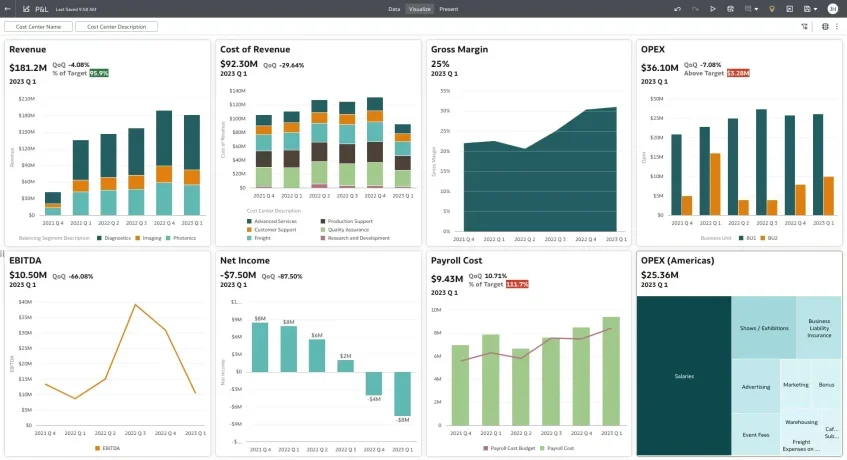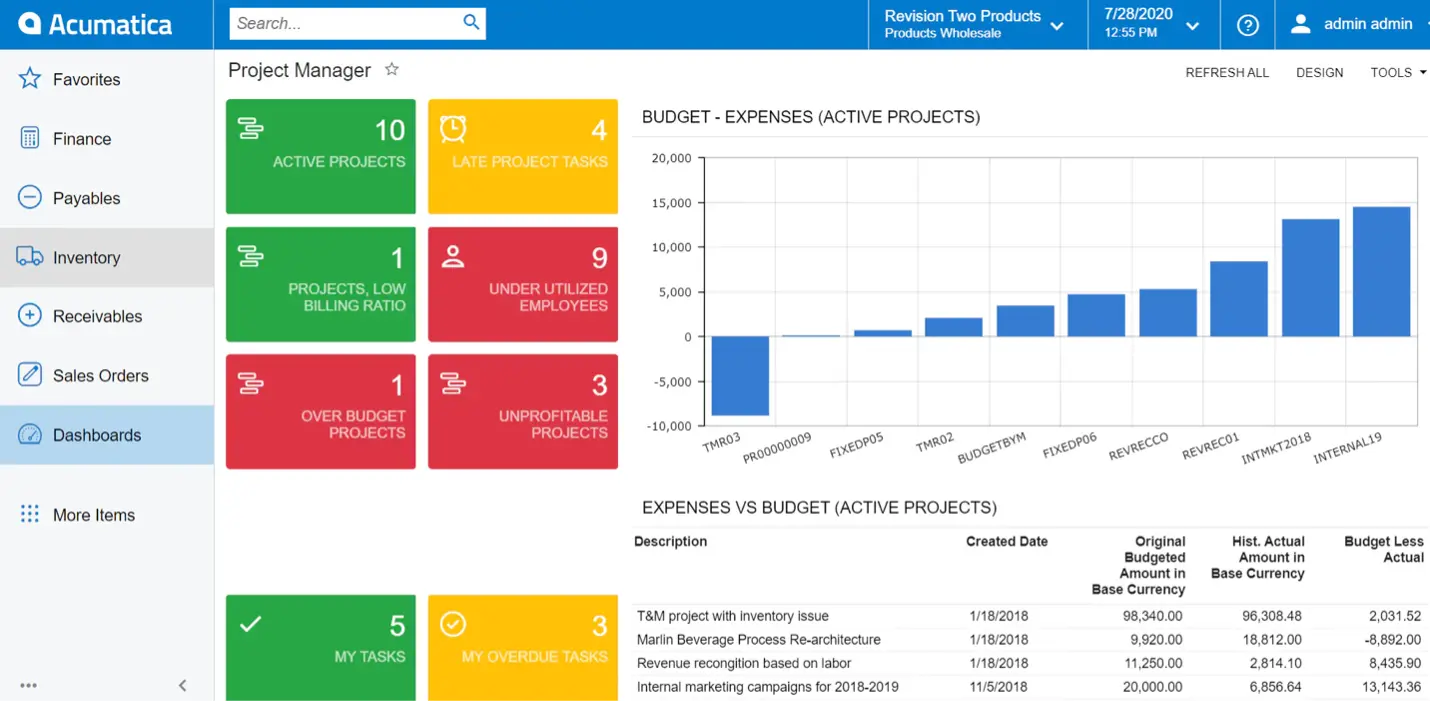AI is revolutionizing Enterprise Resource Planning (ERP) systems, making them more intelligent, predictive, and efficient. It’s no longer just about storing data. Leveraging AI in ERP to deliver actual commercial value is transforming how businesses function and make choices.
According to IMDA, over 20% of ERP solutions currently use AI in areas such as Human Resources, Digital Marketing, and CRM. This AI connection improves efficiency, allowing organizations to make informed, data-driven decisions in line with the trend of intelligent ERP systems.
This article discusses the AI ERP meaning and top AI-powered ERP solutions for Singapore, including ScaleOcean, SAP S/4HANA, Oracle Fusion, Microsoft Dynamics 365, and more. We’ll look at how these solutions employ AI to improve business processes, allowing firms to make more data-driven decisions.
- AI in ERP refers to the integration of AI technology into an organization’s ERP system. This transforms the ERP from a passive data repository into an active, intelligent platform.
- Key benefits of AI-enabled ERP include significant boosts in efficiency, enhanced decision-making, greater data accuracy, and optimized business operations.
- Key AI Technologies in ERP: Machine Learning (ML), predictive analytics, Natural Language Processing (NPA), robotic process automation (RPA), chatbots, and virtual assistants
- Top ERP of AI Capabilities, includes ScaleOcean, SAP S/4HANA, Oracle Fusion, Microsoft Dynamics 365, and more.
- ScaleOcean’s AI-native ERP software helps businesses overcome integration challenges, providing a seamless path to smarter, data-driven operations.

What is AI in ERP?
AI in enterprise resource planning (ERP) incorporates technologies such as machine learning, natural language processing, and predictive analytics into ERP systems. This integration transforms ERP from a mere data storage tool into an intelligent, proactive platform that boosts decision-making and automates various tasks.
The advanced use of ERP software, alongside Artificial Intelligence (AI) transformation, offers businesses a way to sustain growth and significantly boost revenue.
According to Statista, ERP software accounts for 41% of the global software market in terms of revenue. This demonstrates that the use of ERP software with AI is crucial for businesses to optimize their entire processes.
This move enables organizations to anticipate future needs, respond promptly to market changes, and enhance their decision-making processes. Understanding what an ERP system is in this context reveals its potential to become a proactive business partner rather than a reactive one.
Type and Key AI Technologies in ERP
Artificial Intelligence (AI) is revolutionizing Enterprise Resource Planning (ERP) systems by integrating advanced technologies to automate tasks, optimize processes, and provide valuable insights. In its implementation, here are the key AI applications that are transforming ERP systems:
1. Machine Learning (ML)
Machine learning algorithms analyze historical data, identifying patterns and trends, which help ERP systems make accurate predictions and automate decision-making processes. ML improves business operations by continuously learning from data, refining processes, and offering personalized recommendations, reducing human intervention.
2. Predictive Analytics
Predictive analytics leverages AI to analyze current and historical data and also forecast future trends. Intelligence in ERP systems can predict inventory needs, demand fluctuations, supply chain disruptions, and other critical business factors. This enables businesses to make proactive, data-driven decisions to optimize operations and minimize risks.
3. Natural Language Processing (NLP)
Natural language processing allows ERP systems to understand and interpret human language. By integrating NLP, ERP systems can convert unstructured data, such as emails or chat conversations, into structured data.
Implementing intelligent AI aids in automating tasks like customer support, report generation, and document processing, enhancing efficiency and user experience.
4. Robotic Process Automation (RPA)
Robotic Process Automation automates repetitive, rule-based tasks, freeing up employees for more strategic activities. In ERP systems, RPA can handle tasks like data entry, invoice processing, and order management. By integrating RPA, businesses reduce errors, enhance productivity, and streamline workflows, leading to cost savings.
5. Intelligence, Insight, and Automation
AI-driven intelligence insight in ERP systems provides actionable business insights by analyzing large data sets. It identifies hidden patterns, correlations, and trends, offering valuable information for better decision-making.
Also, these insights in AI ERP can guide management in strategic planning, risk management, and optimizing resource allocation across departments.
6. Chatbots and Virtual Assistants
Chatbots and virtual assistants in ERP systems enhance user interaction by providing real-time support and assistance. They can answer queries, assist with tasks like scheduling or report generation, and even offer personalized recommendations. By integrating these AI tools, ERP systems improve user experience and reduce the need for human intervention.
7. Image Recognition
Image recognition technology enables ERP systems to analyze visual data, such as product images or barcodes, and automatically categorize and track items in the system. This is particularly useful in inventory management, quality control, and shipment tracking.
It reduces manual effort, improves accuracy, and accelerates workflows within the ERP ecosystem.
Generative AI in ERP
Generative AI is revolutionizing ERP systems by creating new content, automating processes, and providing advanced decision-making tools. By leveraging advanced algorithms, it enhances efficiency and fosters smarter, data-driven business strategies. Here are some key applications of Generative AI in ERP systems:
1. Report Generation
Generative AI can automate the creation of business reports by analyzing data and generating comprehensive, accurate, and insightful documents. Instead of manually compiling data, AI can quickly produce customized reports, tailored to specific business needs.
This saves time, enhances accuracy, and ensures that decision-makers have up-to-date information for strategic planning.
2. Content Creation
In ERP systems, generative AI can assist in creating content for various business operations, such as product descriptions, marketing copy, or internal documentation.
By understanding the context and target audience, AI generates relevant, high-quality content, reducing the burden on employees. This allows businesses to scale their operations without increasing human resource requirements.
3. Scenario Planning
Generative AI in ERP supports scenario planning by analyzing historical data and predicting potential outcomes for various business strategies. It can generate different scenarios based on input parameters, helping businesses assess risks, opportunities, and alternative strategies.
This predictive capability with generative AI in ERP allows companies to make informed, proactive decisions and prepare for future uncertainties.
Key Benefits of AI in ERP
AI-enabled ERP systems provide practical benefits that boost your profitability and operational agility. They go beyond mere automation to create a more intelligent and resilient firm, which drives long-term growth. Here are the primary advantages of AI-enabled ERP for your business:
1. Increased Efficiency and Productivity
So, with AI taking over those very routine, often time-consuming tasks, it really frees up your team. They can then concentrate on more strategic initiatives instead. It boosts productivity across departments, reducing manual data entry and freeing up time for analysis and innovation.
This kind of increased efficiency really translates into faster process cycles, for all sorts of things, whether it’s closing the books at the end of the month or getting those customer orders fulfilled quicker. The organization becomes more streamlined, doing more with less, exactly what we aim for.
2. Improved Decision-Making
AI really does provide leaders with predictive insights and some very deep analytics, which, in turn, removes much of the guesswork from strategic planning. You can make decisions based on future trends, not just past events, giving you invaluable insights for strategic planning in today’s fast-paced market.
Having access to real-time, AI-driven insights means managers can, well, respond much more quickly to both opportunities and any threats that might pop up. This effectively creates a more agile organization, one that can genuinely pivot effectively based on data as market conditions change.
3. Superior Forecasting
AI leverages predictive analytics to improve forecasting accuracy, enabling businesses to anticipate future trends in areas like sales, demand, and inventory management. By using historical data, AI models can provide more precise predictions, helping businesses plan better and reduce risks associated with uncertain market conditions.
4. Better Customer and Employee Experience
Implementing intelligent AI in ERP enhances both customer and employee experiences by automating responses and offering personalized recommendations.
For customers, AI-powered chatbots provide instant support, while for employees, AI tools assist in improving productivity and job satisfaction by reducing mundane tasks and offering valuable insights for career development.
5. Optimized Financial Management
AI optimizes financial management by automating processes like invoice approvals, payment tracking, and budgeting. It helps identify financial discrepancies, forecast cash flows, and improve financial reporting accuracy.
By enhancing financial visibility, using AI in ERP ensures better decision-making, tighter control over expenses, and improved profitability for the business.
6. Enhanced Accuracy
Let’s be honest, human error is just a natural part of any manual process, and these can, you know, lead to some pretty costly mistakes in business operations. AI-powered automation reduces errors in data entry, order processing, and financial calculations, ensuring your AI ERP software’s data is more reliable and trustworthy.
The direct result of all this is a significantly higher level of data integrity right across the entire system, which is great. This robust data is absolutely crucial for things like accurate financial reporting, staying on top of compliance, and also, just building trust in your business intelligence generally.
7. Optimized Operations
AI algorithms are really good at continuously analyzing your operations, just looking to find opportunities for optimization and improvement. This could involve adjusting inventory to reduce carrying costs or optimizing production schedules for maximum output, fine-tuning every aspect of your business processes.
From complex supply chain logistics all the way to smart resource allocation, AI genuinely helps you run a much leaner and, frankly, a more effective operation. This constant, ongoing optimization pretty much ensures you’re always operating at peak performance, which is, you know, the goal.
8. Better Risk Management
AI is truly incredibly effective at identifying those anomalies and potential risks that might otherwise just be missed by human oversight, which is a big deal. It can flag fraudulent transactions, identify compliance issues, and predict equipment failures, allowing you to address problems before they escalate.
This kind of proactive approach to risk management really does help protect your business from both financial loss and any reputational damage that might come up. It effectively adds a powerful layer of intelligent security and oversight to your overall operations, and that’s something you definitely want.
Example and Common Use of AI in ERP
AI is transforming ERP systems by automating key processes, improving operational efficiency, and driving business growth. Here are some common applications of AI within ERP systems, showcasing how they enhance business processes:
1. Predictive Maintenance
AI in ERP systems enables predictive maintenance by analyzing data from equipment and sensors to predict potential failures. This allows companies to schedule maintenance before a breakdown occurs, reducing downtime and costly repairs. By anticipating issues, businesses can maintain equipment reliability and extend asset lifecycles.
2. Demand Forecasting and Spend Management
AI uses historical data and machine learning models to predict future demand, enabling businesses to adjust their inventory and production plans accordingly. In spend management, AI can optimize purchasing decisions by analyzing trends, identifying cost-saving opportunities, and ensuring more efficient allocation of resources.
3. Digital Transformation
AI accelerates digital transformation by integrating cutting-edge technologies into traditional business operations. In ERP, AI drives automation, enhances data analytics, and enables more agile decision-making, helping organizations modernize their processes and adapt to ever-changing business environments.
4. App Modernization
AI-powered ERP systems assist in app modernization by automating the migration of legacy applications to modern cloud platforms. This helps businesses enhance their system’s scalability, flexibility, and security, while improving integration and user experience with up-to-date software solutions.
5. Automated Invoice Processing
AI automates invoice processing by extracting data from invoices, matching them with purchase orders, and processing payments. This reduces manual entry errors, accelerates approval workflows, and improves cash flow management, ensuring timely payments and enhancing supplier relationships.
6. Customer Support
AI enhances customer support by integrating chatbots and virtual assistants within ERP systems. These tools can provide real-time assistance, resolve common customer queries, and escalate complex issues to human agents. This leads to faster response times, increased customer satisfaction, and reduced service costs.
7. Human Resource Management
AI streamlines human resource management by automating tasks like recruitment, payroll processing, and performance evaluation. It helps HR departments identify top talent, manage employee records, and predict future workforce needs, all while ensuring compliance with labor regulations.
8. Guided Purchasing
AI in ERP systems offers guided purchasing by recommending optimal suppliers, evaluating pricing options, and automating order creation. By using historical data and supplier performance analytics, AI ensures better procurement decisions and helps businesses reduce costs while maintaining quality.
7. Process Mining
Process mining uses AI to analyze workflows within ERP systems, identifying inefficiencies, bottlenecks, and areas for improvement. This enables businesses to optimize operations, reduce waste, and improve process compliance by providing actionable insights into workflow performance.
8. Anomaly Detection
AI-powered anomaly detection in ERP systems identifies unusual patterns or outliers in data, such as discrepancies in financial records or unexpected system behaviors. This proactive approach helps businesses detect fraud, prevent errors, and ensure data integrity across operations.
9. Order and Supply Chain Management
AI enhances order and supply chain management by predicting demand, optimizing stock levels, and automating order fulfillment. It helps businesses reduce stockouts, minimize overstocking, and ensure timely delivery to customers, improving overall supply chain efficiency and customer satisfaction.
10. Automated Summarization
AI in ERP systems can automatically generate summaries of long documents, reports, and communications, providing key insights without the need to read through extensive text. This increases productivity by allowing decision-makers to quickly understand important information and act upon it without delay.
11. Automated Financial Processes
AI-powered automation is revolutionizing finance departments by automating the entire accounts payable process, from invoice reception to payment scheduling, as well as improving account reconciliation. This minimizes manual labor and makes financial procedures much more efficient.
AI systems excel in fraud detection, detecting anomalous transaction patterns in real time. This critical skill protects the company’s financial assets from both internal and external attacks, hence improving security and lowering financial risks.
The Newest State of ERP with AI
As we approach, AI is becoming an integral part of ERP systems, transforming how businesses manage and optimize their operations. The evolving landscape reflects significant trends in AI adoption, accessibility, and workforce transformation. Here are key developments shaping the state of ERP with AI in 2025:
1. More Businesses Are Using AI Assistants and Bots
These days, businesses are increasingly relying on AI assistants and bots to streamline operations, handle routine tasks, and improve user experiences. These AI-driven tools automate data entry, answer queries, generate reports, and assist with decision-making, allowing employees to focus on higher-value tasks.
The rise of conversational AI will further simplify workflows and reduce manual interventions across departments.
2. Cloud Systems Make AI More Accessible
Cloud-based ERP systems are making AI tools more accessible to businesses of all sizes. With the flexibility and scalability of the cloud, companies can integrate advanced AI capabilities into their ERP systems without heavy upfront investments in infrastructure.
This shift is democratizing intelligent AI in ERP software, enabling even smaller businesses to leverage the power of AI for better decision-making and operational efficiency. As a result, businesses can now access the best ERP solutions in Singapore to enhance their operations.
3. A Need for More AI Experts
As AI becomes more embedded in ERP systems, there is a growing demand for skilled AI experts. Businesses are seeking professionals who can develop, implement, and optimize AI tools within ERP systems.
This creates an opportunity for education and training programs focused on AI and ERP integration. The shortage of AI talent is expected to be a significant challenge in the coming years, requiring companies to invest in upskilling their workforce.
4. Not All ERP Vendors Are Up to Speed
While many ERP vendors are incorporating AI into their offerings, not all are keeping pace with advancements in AI technology. Some providers still offer basic automation features, lagging behind competitors with more advanced AI-driven functionalities.
As intelligent AI becomes a standard requirement for businesses, vendors that fail to innovate risk losing market share to those with more robust AI integrations.
5. AI Agents: The New Digital Workers
These days, AI agents are poised to become the new digital workforce. These intelligent AI in ERP, autonomous agents will handle tasks traditionally performed by human employees, such as inventory management, order processing, and customer service.
AI agents will not only improve efficiency but will also provide real-time insights, automate decision-making, and enable businesses to scale without increasing their workforce. These digital workers will become essential in driving productivity and cost savings across industries.
Top ERP With AI Capabilities
Finding the correct ERP system is critical for any organization, particularly in Singapore, where options abound. With several leading providers incorporating AI into their platforms, each in their own way, it is critical to understand the many types of ERP software. Let’s look at the top AI ERP software available today:
1. ScaleOcean AI-Powered ERP Software
ScaleOcean’s AI-driven ERP system is designed to address the obstacles of implementing AI from the start. It addresses data quality challenges and ensures a single, dependable source of truth, making complex analytics accessible to non-experts while improving usability and data integrity.
ScaleOcean, built from the ground up with AI at its core, provides an intelligent, unified platform that is nimble and scalable for ASEAN enterprises looking to grow. It excels at converting data into proactive recommendations, making it the best AI-Native ERP for Singapore SMEs.
ScaleOcean offers Singapore advanced AI ERP solutions that help businesses improve productivity, streamline processes, and drive data-driven decisions. The solution enhances operational efficiency, providing key insights for informed decision-making, with additional benefits such as eligibility for the CTC grant.
Key Features:
- Predictive Analytics for Forecasting: Helps businesses forecast trends and make data-driven decisions to stay ahead of market demands.
- Natural Language Processing (NLP): Enables intuitive interaction with the system, making it easier for non-experts to access insights.
- Robotic Process Automation (RPA): Automates repetitive tasks, increasing efficiency and reducing human error.
- Machine Learning for Continuous Process Improvement: Continuously improves processes, ensuring the system evolves and adapts to business needs.
- Data Quality Management: Ensures a single, dependable source of truth, improving data integrity and usability across the organization.
| Pros | Cons |
|---|---|
|
|
Best For: ScaleOcean’s AI-Native ERP software is suitable for forward-thinking Singapore enterprises that want to use AI to gain a competitive advantage. It simplifies complex analytics while maintaining trustworthy data quality and proactive insights, making it ideal for SMEs looking to scale up and improve operational efficiency.
2. SAP S/4HANA AI-Powered ERP Platform
SAP S/4HANA is a familiar name in ERP, with SAP Leonardo integrating machine learning into business processes, from finance to manufacturing. It’s an in-memory database that supports real-time analytics and large data volumes. Tools like Joule AI Copilot enhance efficiency and decision-making across functions.
For large enterprises needing really deep, industry-specific functions, SAP is often a good choice. It’s quite clear their focus is on delivering intelligent automation at scale, which makes sense given their market.
Key Features:
- Embedded machine learning through the SAP Leonardo platform.
- In-memory database for real-time analytics.
- Comprehensive coverage across finance, manufacturing, and more.
- Optimized for handling large data volumes.
- Strong industry-specific functionalities.
| Pros | Cons |
|---|---|
|
|
Best For: Large businesses that need extensive, sector-specific ERP functionality are the ideal candidates for SAP S/4HANA. It is perfect for companies with complicated needs, especially those involved in manufacturing, finance, and large-scale operations, because of its robust AI-driven features and scalability.
3. Oracle Fusion Cloud ERP System
Oracle’s cloud-based ERP system naturally comes packed with built-in AI and machine learning, which is pretty standard for them now. It really zeroes in on automating routine tasks and giving you predictive insights, which can be helpful for things like financial planning and managing your supply chain effectively.
Where Oracle really shines is in its comprehensive suite of applications, which covers a lot of ground. And, of course, there’s its focus on cloud-native AI capabilities, a direction that many businesses are moving towards for their ERP systems.
Key Features:
- Built-in AI and machine learning.
- Automation of routine business processes.
- Predictive insights for decision-making.
- Cloud-native, providing flexibility and scalability.
- Comprehensive suite of applications for various business functions.
| Pros | Cons |
|---|---|
|
|
Best For: For medium-sized to big businesses looking for a complete cloud-based solution with robust AI capabilities, Oracle Fusion Cloud ERP is the best option. Businesses that require sophisticated automation, predictive analytics, and wide application coverage, particularly in the financial and supply chain sectors, will find it ideal.
4. Microsoft Dynamics 365 AI ERP Software
Microsoft Dynamics 365, as you might expect, integrates well with the entire Microsoft ecosystem, bringing in Azure AI and Power BI. This integration offers great customization, allowing you to build custom AI models, with Copilot and Azure AI further enhancing automation and decision-making.
I’d say the biggest draw for Dynamics 365 is its seamless integration with familiar tools, like Office 365, which can make adoption a lot smoother for teams already comfortable in that environment. This familiarity often reduces the learning curve significantly, which is always a plus.
Key Features:
- Integration with the Microsoft ecosystem (Azure AI, Power BI).
- Customizable AI models for tailored ERP solutions.
- Advanced data analytics and reporting.
- Strong focus on CRM and HR functionality.
- Seamless integration with Office 365 and other Microsoft tools.
| Pros | Cons |
|---|---|
|
|
Best for: Businesses already part of the Microsoft ecosystem are the best candidates for Microsoft Dynamics 365. It’s ideal for businesses that require extensive flexibility, seamless Microsoft tool integration, and a strong focus on financial, HR, and CRM features.
5. Acumatica Cloud-Based AI ERP
Acumatica stands out as a cloud-based ERP, often recognized for being flexible and having a very user-friendly interface, which is quite important. They’ve been steadily adding AI and machine learning to boost features like expense receipt recognition and business intelligence, making it a pretty good AI ERP software option.
The goal is to provide an adaptable and accessible cloud ERP solution that continues to evolve with the integration of growing AI features. It’s a good fit for businesses looking for something that can evolve with their needs.
Key Features:
- Cloud-based ERP with flexible deployment options.
- Machine learning for business intelligence and expense recognition.
- User-friendly interface for easier adoption.
- Strong mobile accessibility.
- Built-in tools for financial management and inventory tracking.
| Pros | Cons |
|---|---|
|
|
Best For: Small to medium-sized enterprises seeking a user-friendly, adaptable cloud-based ERP system are the ideal candidates for Acumatica. Businesses looking for a user-friendly interface, robust mobile access, and business intelligence powered by machine learning will find it ideal.
6. Epicor Kinetic AI ERP Solution
Epicor Kinetic is quite interesting because it’s an ERP solution built almost entirely with the manufacturing industry in mind, which is a specific niche. It leverages AI to offer insights into production processes, managing the supply chain, and keeping inventory under control, meaning its AI features are relevant for manufacturers.
Essentially, this system is crafted to empower manufacturers, helping them truly optimize their operations with some really sharp data-driven production insights. It’s all about making production lines smarter and more efficient.
Key Features:
- AI-driven production process insights.
- Supply chain management optimization.
- Inventory control and tracking features.
- Tailored specifically for manufacturing industries.
- Data-driven insights to improve efficiency.
| Pros | Cons |
|---|---|
|
|
Best For: For manufacturing companies that need specialist ERP systems, Epicor Kinetic is the ideal option. It is perfect for manufacturers who want to improve operational efficiency and data-driven decision-making because of its emphasis on inventory control, supply chain management, and production optimization.
7. Infor CloudSuite AI ERP Platform
Infor CloudSuite really shines by using its Coleman AI platform to roll out very industry-specific ERP solutions. This AI is actually designed to work alongside human efforts, offering recommendations and automating tasks within particular sectors like healthcare or manufacturing, making it a compelling option for AI ERP solutions.
It seems Infor’s core strategy is quite clear: they want to give businesses deep industry expertise powered by AI. This specialized focus can be valuable for businesses in those specific verticals.
Key Features:
- Industry-specific ERP solutions powered by Coleman AI.
- Recommendations and task automation tailored to specific industries.
- Real-time analytics for informed decision-making.
- AI-driven process improvement and workflow automation.
- Strong focus on sectors like healthcare, manufacturing, and retail.
| Pros | Cons |
|---|---|
|
|
Best For: Businesses in the manufacturing, retail, and healthcare sectors that require ERP systems tailored to their particular needs are the greatest candidates for Infor CloudSuite. It’s perfect for businesses looking to boost operational performance with real-time analytics, AI-driven automation, and in-depth industry knowledge.
8. IFS Cloud ERP Platform
IFS Cloud brings a really comprehensive single platform to the table, combining ERP with Enterprise Asset Management (EAM) and Field Service Management (FSM). AI helps asset-intensive industries optimize maintenance, manage service calls, and improve operational efficiency, delivering key benefits in performance and resource management.
In essence, IFS is delivering a unified platform for managing complex operations, all with the smart assistance of AI. This holistic approach can make a big difference in streamlining intricate business processes.
Key Features:
- Combines ERP with Enterprise Asset Management (EAM) and Field Service Management (FSM).
- AI-driven insights to optimize maintenance and service management.
- Comprehensive asset management features.
- Integration of real-time data for smarter decision-making.
- Scalability to meet the needs of asset-intensive industries.
| Pros | Cons |
|---|---|
|
|
Best For: Asset-intensive sectors, including manufacturing, utilities, and energy, are most suited for IFS Cloud. For companies that need to maximize maintenance, service management, and operational efficiency, an all-inclusive solution that combines ERP with EAM and FSM is ideal.

Challenges of Implementing AI in ERP
While the advantages of AI in ERP are obvious, successful application can be difficult. Understanding potential roadblocks early on is critical for good planning and seamless integration. Here are some important challenges and concerns to bear in mind throughout the process:
1. Data Quality
AI relies heavily on high-quality data to generate accurate insights and predictions. Poor data quality, such as incomplete, outdated, or inaccurate data, can lead to incorrect outcomes, affecting decision-making. Ensuring consistent and clean data across all departments is crucial for AI to deliver meaningful results within ERP systems.
2. High Initial Cost
Implementing AI in ERP systems involves significant upfront investment in technology, infrastructure, and training. The cost of AI tools, software integration, and consulting services can be prohibitive for smaller businesses.
Additionally, the return on investment (ROI) may not be immediate, which can deter organizations from adopting AI-driven ERP solutions.
3. Technical Complexity
Integrating AI into existing ERP systems can be technically challenging due to the complexity of the algorithms and the need for seamless integration with legacy systems.
This requires skilled technical resources and may involve long implementation timelines. The technical expertise needed for setup, maintenance, and troubleshooting adds to the overall complexity.
4. Change Management
Introducing AI into ERP systems requires effective change management to ensure smooth adoption by employees. Resistance to change, lack of understanding, or fear of job displacement can hinder the successful implementation of AI.
Businesses must invest in intelligent AI in ERP to employee training, clear communication, and leadership support to manage this transition effectively.
5. Cybersecurity Risk
AI systems within ERP platforms introduce new cybersecurity risks, including data breaches and system vulnerabilities. As AI processes vast amounts of sensitive data, ensuring robust security measures is vital to protect against hacking, unauthorized access, and data leaks. Regular security updates and risk assessments are crucial to mitigate these risks.
6. Skill Gaps and Employee Training
Bringing an AI-powered ERP into the mix definitely calls for some new skills across your team. Everyone needs to grasp how the new system works, how to interpret the insights it provides, and, crucially, how to actually trust its recommendations, which often highlights a skills gap that must be addressed for successful AI ERP solutions.
Solid employee training and change management are crucial for user adoption and maximizing technology investments. According to EDB Singapore, SAP Labs Singapore will hire and train nine AI researchers by 2030, supporting the lab’s ongoing growth and innovation.
Future of Artificial Intelligence (AI) in ERP
The future of AI in ERP is filled with exciting possibilities that promise to transform how businesses operate. As AI technologies evolve, ERP systems will become more intelligent, intuitive, and capable of handling complex tasks autonomously. Below are some key trends shaping the future of AI in ERP systems:
1. Autonomous Decision-Making
In the future, AI-driven ERP systems will be capable of making decisions autonomously, based on real-time data and predictive models. This will reduce human intervention in routine decision-making processes, allowing businesses to react faster to market changes, optimize operations, and enhance overall efficiency without manual oversight.
2. Voice-Activated Operations
Voice-activated operations are set to become a major trend in ERP systems, allowing users to interact with the software through voice commands. This will simplify processes, increase accessibility, and enhance user experience, especially in mobile and on-the-go environments.
By implementing intelligent AI in ERP, employees can easily query data, generate reports, or execute tasks without needing to manually navigate the system.
3. Self-Healing System
Future ERP systems will leverage intelligent AI to create self-healing capabilities, automatically diagnosing and fixing issues without human intervention.
By detecting system errors, data discrepancies, or performance bottlenecks, AI will be able to take corrective actions, ensuring that ERP systems operate smoothly with minimal downtime and reduced reliance on IT support.
4. Deeper Industry Specialization
As AI continues to evolve, ERP systems will become more specialized to meet the unique needs of different industries. AI will enable ERP systems to offer tailored solutions, from manufacturing and retail to healthcare and finance, by incorporating industry-specific data models and best practices.
This deeper specialization will help businesses in various sectors optimize their processes and gain a competitive edge.
5. Hyper-automation
Hyper-automation, well, that’s this concept of using a mix of AI, machine learning, and robotic process automation (RPA) to automate, like, as much as humanly possible. It goes beyond simple task automation, orchestrating complex workflows across systems, and will be a key feature in future ERP systems.
This approach is going to bring about just incredible levels of efficiency and agility, truly. Businesses will then be able to adapt to market changes almost instantly, with AI-driven processes reconfiguring themselves as needed, which is a major point for sustaining business growth.
6. Augmented Analytics
Augmented analytics, using AI, will make data analysis so much more accessible, like truly accessible for everyone. The system automatically finds insights in your data, presenting them in simple language, reducing the need for a dedicated data scientist and democratizing data across the organization.
Conclusion
AI integration in ERP systems is no longer a futuristic concept. It is already transforming company operations. Businesses have transitioned from data-recording systems to platforms that anticipate, recommend, and automate, creating considerable prospects for competitive advantage, particularly in Singapore.
Vendors such as ScaleOcean provide AI-powered ERP systems that improve efficiency and intelligence across a variety of company operations. ScaleOcean ERP is the ideal answer for businesses striving to thrive, since it includes features that optimize processes and improve decision-making. Contact ScaleOcean for a free demo.
FAQ:
1. Will AI eventually replace ERP?
AI is unlikely to fully replace ERP systems but will significantly improve them. It will automate manual tasks, provide predictive analytics, and support decision-making, working in tandem with ERP systems to enhance their capabilities, rather than replace their core functions.
2. What is the difference between AI in ERP and a standalone AI tool?
AI integrated into ERP enhances the system’s core processes, optimizing functions like automation and data analysis. In contrast, standalone AI tools are independent and typically focus on specialized tasks, operating outside of an ERP system’s core infrastructure.
3. How can a small business in Singapore start implementing AI in its ERP?
Small businesses in Singapore can begin AI implementation by selecting an ERP system that supports AI features. They should prioritize specific AI functions, such as automating workflows, and ensure their team is trained to fully leverage AI’s potential within their ERP.
4. What is generative AI in the context of ERP?
Generative AI in ERP refers to artificial intelligence that creates new outputs, such as insights or predictions, from existing data. It boosts ERP systems by automating tasks like generating reports and enhancing decision-making, making business operations more efficient.














 PTE LTD..png)
.png)

.png)








.png)
.png)
















